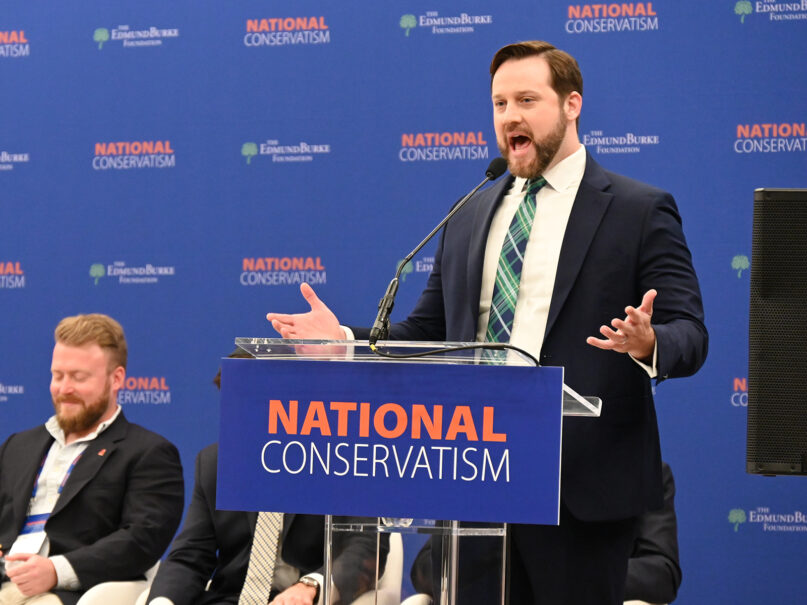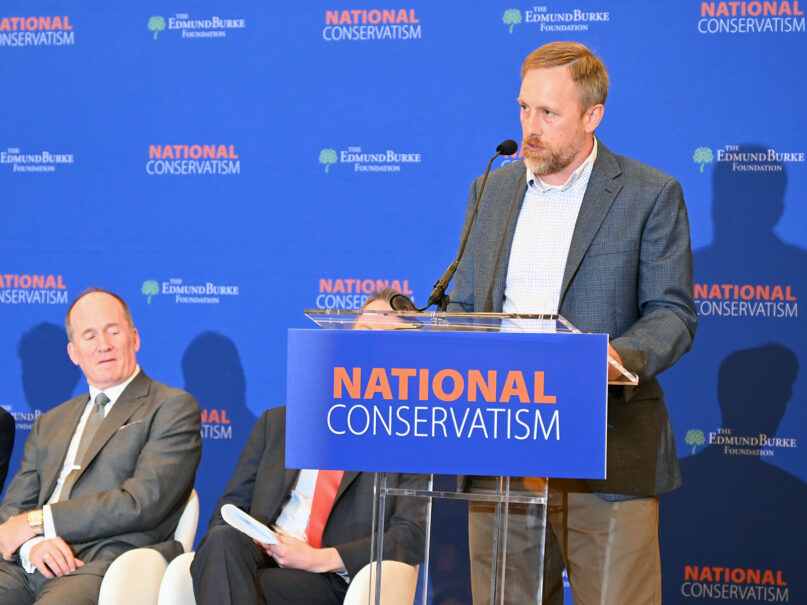WASHINGTON (RNS) — During a breakout session at this year’s National Conservatism Conference on Wednesday (Sept. 3), one group of panelists was asked an unusual question: Did they consider the U.S. to be a “Protestant tree” in which “Jews and Catholics are allowed, as birds, to nest in the branches”?
Josh Hammer, the only Jewish member of the panel, eschewed the arborial analogy but replied that he believes Jews and Catholics “have always been a part of the American story.” A “more interesting question,” he offered, is what Founding Fathers had to say about “Mohammedism” — a reference to Islam.
Fellow panelist William Wolfe, head of the Center for Baptist Leadership and a self-described Christian nationalist, interjected: “I’m happy to cut that branch off, Josh.”
The crowd burst into laughter.
The episode was one of several derogatory mentions of Islam at the conference, a three-day convening at a hotel in downtown Washington. Once considered a far-right fringe gathering and still deeply associated with Christian nationalism, NatCon, as it’s known among its regular attendees, has become a major waypoint in the conservative calendar. The ideas germinated here increasingly shape the ideological framework of the Trump administration, as speakers at past conferences have gone on to become MAGA stars, including Vice President JD Vance.
This year’s lineup had no lack of administration officials, from Office of Management and Budget Director Russell Vought to border czar Tom Homan.
NatCon’s negative focus on Islam, therefore, makes for a potential preview of what conservatives will be concerned with in the next year, especially in midterm election campaigns. Already, New York’s mayoral election in November has attracted dire predictions in conservative circles about the front-runner, Zohran Mamdani, and his Muslim faith, should he win.

William Wolfe speaks during the National Conservatism Conference, Sept. 3, 2025, in Washington. (RNS photo/Jack Jenkins)
The topic was a focus of the conference’s first panel on Tuesday, titled “The Threat of Islamism in America.” Ryan Girdusky, a onetime CNN commentator who was banned from the network last year after he jocularly implied that Muslim journalist Mehdi Hasan had ties to terrorist groups, was among the panelists. (“I hope your beeper doesn’t go off,” he said on air, in an apparent reference to the 2024 attack directed at Lebanon-based militant group Hezbollah, when beepers across the country, planted with explosive charges, suddenly ignited.)
At NatCon, Girdusky argued against mass immigration generally (“The best part of immigration is scarcity,” he said), and Muslim immigration in particular. Echoing a theme aired in speeches in recent months by Vance, Girdusky said Mamdani, a naturalized U.S. citizen, drew crowds at his rallies whose “ancestors did not come on the Mayflower. Most did not come on Ellis Island. Most didn’t come in the past 30 years.”
Another panelist, Wade Miller of the Center for Renewing America, a think tank founded by OMB Director Vought, was even more explicit. “Islam is anti-Christianity, authoritarian and against our entire constitutional order,” Miller said. He insisted the progressive left in the United States has embraced a “woke-Islamist alliance,” pointing to the pro-Palestinian activism that swept college campuses as Israel invaded the Gaza Strip. He later declared that “we are a Christian nation.”

Wade Miller speaks during the National Conservatism Conference, Sept. 2, 2025, in Washington. (RNS photo/Jack Jenkins)
Another CRA activist, senior fellow Nathan Pinkoski, warned thatthe U.S. could become like Europe, where, he argued, the continent’s “trashed civilizational immune system” allowed “Islamists to make inroads into European nations.”
Anti-Muslim sentiment is hardly new among American conservatives, nor is it unusual for it to appear at NatCon — the 2024 iteration of the conference also featured a talk on “The Islamic Supremacist Challenge to America.”
But when questioned about the urgency of their message, at least one of the panelists could give no rationale for the timing of their warnings, or why Islam was on the agenda at all. Miller said he wasn’t sure, guessing only that “maybe” it was because of recent U.S. strikes in Iran.
Nonetheless, Islam was a recurring component of the larger discussion of immigration. Bo French of Fort Worth, Texas — who chairs the Tarrant County Republican Party and has himself been accused of anti-Muslim comments — said he came to the Islamism panel out of concern that the U.S. will end up with an influx of Muslim immigrants such as countries in Europe, especially the United Kingdom, have experienced. “I think we’re probably 10 years behind where they are, but I think it is accelerating,” French said.
Hammer, senior editor-at-large at Newsweek, also tied his concern to immigration but insisted the issue is of immediate importance. “I think that Islamic immigration should be zero today,” Hammer told RNS. “It is a pressing concern.”
Muslims represent around 1% of the U.S. population, according to Pew Research, and the Trump administration has dramatically restricted immigration in various ways that include banning entry from many Muslim-majority countries. A 2022 poll from the Public Religion Research Institute found that while a slim majority of white evangelicals believe the U.S. should “prevent people from some Muslim majority countries from entering the U.S.,” majorities of every other religious group polled said the reverse.
Trump courted Muslim votes in his 2024 presidential campaign, capitalizing on Muslim disenchantment with the Biden administration’s support for Israel.
Miller acknowledged the growing Muslim interest in Republican ideas in his panel presentation, saying, “Some on our side … insist that we should see Islam and Muslims as political allies,” he said. But Muslims, he summed up, “are not our friends.”







